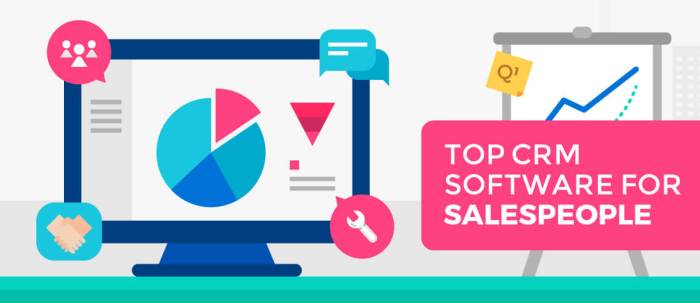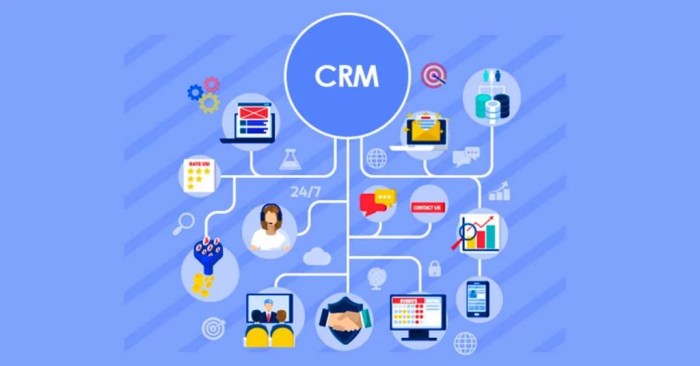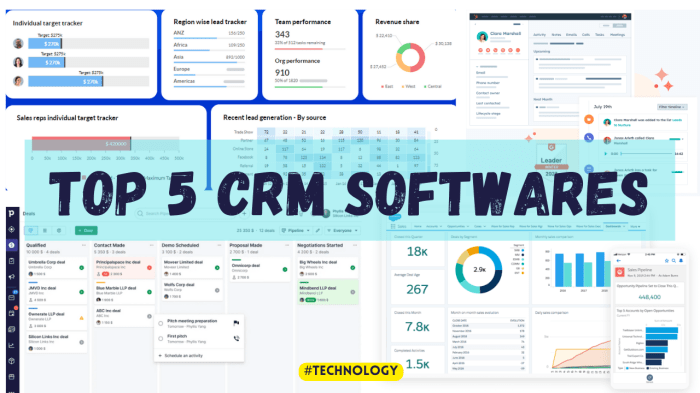Best sales crm software – Choosing the right Customer Relationship Management (CRM) software can be a game-changer for your sales team. A well-implemented CRM system streamlines processes, improves sales efficiency, and ultimately boosts revenue. But with a plethora of options available, selecting the best fit for your business can feel overwhelming. This detailed guide will explore the top sales CRM software solutions, helping you navigate the market and make an informed decision.
We’ll delve into key features, pricing, integrations, and more, providing you with the knowledge to choose the perfect CRM to propel your sales growth.
Understanding Your CRM Needs: Key Considerations Before Choosing
Before diving into specific software, it’s crucial to assess your business’s unique requirements. Consider the following factors:
- Sales Team Size and Structure: A small team might benefit from a simpler, more affordable CRM, while a larger team needs a scalable solution with advanced features and robust reporting capabilities.
- Budget: CRM software pricing varies widely, from free options with limited functionality to enterprise-level solutions with substantial costs. Determine your budget constraints upfront.
- Sales Process Complexity: Do you have a straightforward sales cycle or a more complex one involving multiple stages and stakeholders? The CRM should align with your process.
- Integration Needs: Consider existing software like email marketing platforms, accounting software, or marketing automation tools. The CRM should integrate seamlessly with these systems.
- Desired Features: Prioritize essential features such as contact management, lead tracking, sales pipeline visualization, reporting and analytics, and customer support capabilities.
- Scalability: Choose a CRM that can adapt to your business’s growth. Ensure it can handle an increasing number of contacts, users, and data as your business expands.
Top Sales CRM Software Options: A Detailed Comparison
The market offers a wide range of CRM software, catering to diverse business needs and budgets. Here’s a closer look at some of the leading contenders:
1. Salesforce Sales Cloud
The Industry Leader
Salesforce is a household name in the CRM world, known for its robust features, scalability, and extensive customization options. It’s a powerful solution for large enterprises but can also be tailored for smaller businesses. However, it comes with a higher price tag and a steeper learning curve.
- Key Features: Contact management, lead management, opportunity tracking, sales forecasting, collaboration tools, mobile accessibility, extensive integrations.
- Pricing: Varies greatly depending on the chosen edition and features; typically subscription-based.
- Pros: Powerful, scalable, highly customizable, extensive integrations.
- Cons: Expensive, complex interface, steep learning curve.
2. HubSpot CRM
A Powerful and Affordable Option
HubSpot offers a freemium model, making it an attractive option for startups and small businesses. Its user-friendly interface and comprehensive features make it a strong contender. As your business grows, you can easily upgrade to paid plans with advanced functionalities.
- Key Features: Contact management, deal tracking, email marketing integration, live chat, reporting and analytics, sales automation.
- Pricing: Offers a free plan with limited features and paid plans with increasing functionality.
- Pros: User-friendly, affordable, scalable, robust integrations.
- Cons: Some advanced features require paid plans.
3. Zoho CRM
A Versatile and Feature-Rich Solution
Zoho CRM provides a comprehensive suite of tools at a competitive price. It’s known for its versatility and ability to cater to various business sizes and industries. Its extensive features and integrations make it a compelling choice.
- Key Features: Contact management, lead management, sales pipeline management, workflow automation, social media integration, mobile accessibility.
- Pricing: Offers various plans to suit different business needs and budgets.
- Pros: Feature-rich, affordable, scalable, good integrations.
- Cons: Can feel overwhelming for users with simple needs.
4. Microsoft Dynamics 365 Sales
Integrated with the Microsoft Ecosystem
If your business heavily relies on the Microsoft ecosystem, Dynamics 365 Sales is a natural fit. It integrates seamlessly with other Microsoft products like Outlook and Excel, enhancing productivity and data consistency. It’s a powerful solution but requires a significant investment.
- Key Features: Lead management, opportunity management, sales forecasting, account management, integrated with other Microsoft products.
- Pricing: Subscription-based, with pricing varying based on features and user licenses.
- Pros: Seamless integration with Microsoft ecosystem, powerful features, robust reporting.
- Cons: Can be expensive, requires technical expertise for optimal utilization.
5. Pipedrive
Focus on Sales Pipeline Management
Pipedrive stands out with its intuitive sales pipeline visualization. It simplifies sales process management, allowing sales teams to easily track deals and monitor progress. It’s a great choice for businesses prioritizing pipeline visibility and efficiency.
- Key Features: Sales pipeline visualization, deal tracking, activity management, email integration, reporting.
- Pricing: Subscription-based, with various plans catering to different team sizes.
- Pros: User-friendly, strong focus on sales pipeline management, affordable options.
- Cons: Limited customization options compared to other CRMs.
Choosing the Right CRM: A Step-by-Step Guide
1. Define your needs
Clearly Artikel your business requirements, budget, and team size.
2. Research different CRMs

Source: mailshake.com
Explore the features, pricing, and user reviews of various CRM solutions.

Source: techjockey.com
3. Request demos
Schedule demos with shortlisted CRM providers to get a hands-on experience.
4. Consider integrations
Ensure the CRM integrates with your existing software.
5. Evaluate scalability
Choose a CRM that can adapt to your future growth.
6. Read user reviews
Gain insights from other businesses’ experiences with different CRMs.
7. Select the best fit
Based on your assessment, choose the CRM that best aligns with your needs and budget.
Frequently Asked Questions (FAQ)
- Q: What is a CRM? A: CRM stands for Customer Relationship Management. It’s software designed to manage and analyze customer interactions and data throughout the customer lifecycle.
- Q: How much does CRM software cost? A: CRM pricing varies greatly depending on the vendor, features, and number of users. Options range from free plans to enterprise-level solutions costing thousands of dollars per year.
- Q: Which CRM is best for small businesses? A: HubSpot CRM, Zoho CRM, and Pipedrive are popular choices for small businesses due to their affordability and user-friendly interfaces.
- Q: How long does it take to implement a CRM? A: Implementation time depends on the complexity of the CRM and the size of your business. It can range from a few weeks to several months.
- Q: What are the benefits of using a CRM? A: Benefits include improved customer relationships, increased sales efficiency, better lead management, enhanced data analysis, and streamlined workflows.
Resources
//www.zoho.com/crm/”>Zoho CRM
//www.pipedrive.com/”>Pipedrive
Call to Action: Best Sales Crm Software
Ready to transform your sales process and boost your revenue? Explore the CRM options discussed above and choose the one that best fits your business needs. Start your free trial today and experience the power of a streamlined sales workflow!
Popular Questions
What is the average cost of sales CRM software?
The cost varies widely depending on features, number of users, and vendor. Expect to see options ranging from free plans with limited functionality to enterprise solutions costing thousands of dollars per month.
How long does it typically take to implement a new CRM system?
Implementation time depends on the complexity of the system and the size of your business. Smaller businesses might see implementation within weeks, while larger organizations could take several months.
What are some common integration challenges with CRM systems?
Common challenges include data migration issues, conflicts with existing systems, and ensuring seamless data flow between different platforms. Careful planning and choosing a CRM with robust integration capabilities are crucial.

Source: hastagtechnology.com
How can I measure the ROI of my CRM investment?
Track key metrics like sales conversion rates, deal closure times, customer satisfaction, and overall revenue growth. Compare these metrics before and after CRM implementation to assess ROI.
